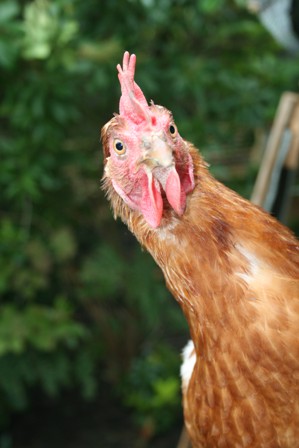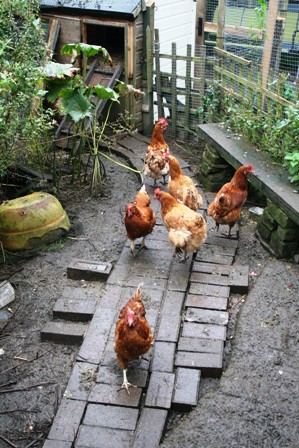
An ex-bat: now in a rather more comfortable new home
It’s not about the eggs
Whether it’s the economic downturn, a television-led increase in awareness or a sign of a more caring society, the latest leisure activity enjoying a boom isn’t about physical fitness; it’s about poultry. TLR managing editor Mick Owen reports from the coop.

An ex-bat: now in a rather more comfortable new home
If the growing popularity of hen husbandry has passed you by you may have to take it on trust that throughout the UK an increasing number of people – mainly women, it has to be said – are giving over large tracts of their non-work time and small tracts of their gardens to the care of chickens. As a purely non-scientific example The Leisure Review’s book-keeper and 50% of First City Events – the people who are managing our symposium for us – spend as much time discussing layer pellets and anti-fox fencing as they do invoice chasing and delegate management. As leisure pursuits go it has all the trademarks of a classic ‘hobby’: you start small but soon get sucked in; you spend a growing amount of time involved in it; there are endless internet sites about it, often with forums; when you meet a kindred spirit the conversation expands to fill the space available; and it costs far more than you bargained for.
One leading exponent of backyard hen-keeping, and indeed of all things down-sizing, is Richard Cannon, a former railway manager who left the rat race to become more self-reliant and now, in addition to being Kent County Cricket’s dressing room attendant at Canterbury in the summer, is something of a guru on frugal living. His view on chicken-keeping is that “they are great pets and the positives far outweigh the negatives. As long as you don’t mind the negatives now and again.” The positives are the friendliness of the birds, the calming effect of spending time with them and the free range eggs. The negatives involve inclement weather, the birds’ excretions, their ability to denude any vegetation in double quick time and the constant threat of predators. One thing that is clear is that with eggs around £2 a dozen and chickens capable of at most one egg per day (when they feel like it) any idea that backyard hens can be a profitable sideline is nonsense. Gill Coltman, who keeps three hens in her back garden in the Scottish borders, explains the attraction: “I had some free time between 6am and 7am each morning and chickens seemed like the ideal way of entertaining myself, there being no other early risers in the house to chat to. In a very short time, entertainment has turned into mild obsession and I am now prone to unseemly displays of pride and congratulation when I find a warm egg in amongst the morning shavings. There have of course been complaints from my co-habitees, usually shouted through open windows when my early morning (two-sided) conversations wake them before the alarm, although one of Mary’s double-yokers for breakfast usually restores peace. With the promise of three ex-battery rescue hens arriving next month the entertainment seems to have grown legs and I’m finding new skills as garden architect and joiner – all positive stuff.”
Like dogs, chickens bring contentment and companionship, unless you keep them on an industrial scale and it is when the subject of commercial chicken keeping comes up that the otherwise relaxed, self-consciously oddball backyard keepers come over angrily militant. The battery farming of hens for eggs is a barbaric and inhumane practice that has no place in a civilised society. That politicians, having been made aware of the facts, allow it to continue is in itself all the evidence required for our elected representatives jointly and severally to be found guilty of the most corrupt form of hypocrisy. The mild-mannered cook and broadcaster Nigel Slater has described battery farming thus: “Unless otherwise marked eggs are gathered from a battery unit, in which birds are stored in cages so small the creatures can hardly turn around. They are fed automatically and spend their lives in total confinement.” But it is not solitary confinement and the stressed birds peck at each other and themselves. After a year, when their forced productivity drops, they are slaughtered unless they are rescued. The British Hen Welfare Trust is a campaigning charity which buys, collects and re-houses as many ex-battery hens as they can, a figure running at 60,000 a year. Many backyard keepers either come to keep hens in response to BHWT campaigns and the celebrity prompting of Jamie Oliver, Jimmy Doherty or Hugh Fearnley-Whittingstall or they add ‘ex-bats’ to an existing flock.
Jayne Elizabeth bought two healthy young Warren chickens from a small-holding neighbour but within weeks had been convinced to increase her flock with four ex-bats. “I loved the experience of keeping Babs and Gertie and thought about buying more,” she explained. “A friend told me about the work BHWT does and I contacted them. When a farm nearby ‘depopulated’ I was asked to say how many girls I would be able to take. As we drove to the isolated farmhouse being used to distribute the rescued birds we joined queues of cars coming from all over the region on the same mission. The hens were corralled behind some tables and were a pitiful sight. Their combs were distended, they had huge patches of feathers missing, their claws were elongated and spindly, and they had virtually no colour. When we got our four new birds home they seemed like alien creatures beside our two originals and they clearly had no idea about things like wind and rain. They would stand for hours without the energy or inclination to move. Grass, slugs and the sun came as huge shocks to them.”
Two months on the new chickens are healthy, feathered-up and a deep red. The flock produces an average of four eggs per day which Jayne sells to friends and neighbours to offset costs. However, as she says, “It’s not about the eggs.”
Mick Owen is managing editor of The Leisure Review and a long-standing vegetarian.
The Leisure Review, October 2010
© Copyright of all material on this site is retained by The Leisure Review or the individual contributors where stated. Contact The Leisure Review for details.
Download a pdf version of this article for printing
